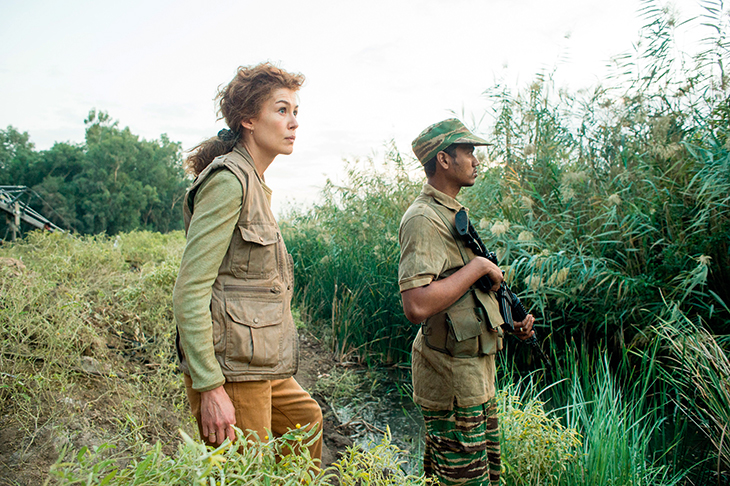A Private War is a biopic of the celebrated Sunday Times war correspondent Marie Colvin who was, judging from this, brave, humane and utterly fearless as well as a drunk, lonely, traumatised and annoying. A complicated human being, in other words. And why did she do it? Why did she risk her life to get the truth out there? No easy answers are offered, thankfully. It may just be that she had to face death to feel properly alive. I can only say, with confidence, that the film features a magnificently fierce, alert and impassioned performance from Rosamund Pike, whose usual English rose delicacy is nowhere to be seen. It is top work, properly.
Directed by Matthew Heineman, who is otherwise a documentary maker (Cartel Land, City of Ghosts), the film opens with an aerial view of a devastated Homs (Syria), the place that would prove to be her Waterloo. (Colvin was killed there in 2012, having been directly targeted by the Assad regime.) It then flashes back, episodically, showing her in the field and witnessing terrible atrocities in Timor, Iraq and Sri Lanka where she was blinded in one eye by shrapnel, hence the eye patch. These scenes show rubble and mines and shelling and mass graves and dead children and also the particular young girl bleeding to death that would come to haunt her dreams. These images all jumble together, harrowingly, just as, I think we are meant to understand, they did in her mind.
Her work life is alternated with her home life. She was American — Pike speaks in a gruff drawl — but lived in London and this life was a battle front too. She suffered panic attacks. Her dreams made her scream in the night. She was admitted to hospital with PTSD. She turned to sex when the booze couldn’t numb her feelings. She wouldn’t follow her editor’s advice. I’ve made her sound like a nightmare, and she was, but she was also raucous and fun and Pike brings out her vulnerability. That is, her desperation to live fully a life that had nothing to do with death, and failing to do so. ‘You’re addicted,’ says Paul Conroy (a surprisingly terrific Jamie Dornan), the photographer who worked with her. And that is plainly true.
Some have said this film has bought too heartily into the cult of Colvin, and does not ask important questions such as: did she put others in danger? Was she (and another journalist) killed because her satellite broadcasts told the Syrian regime where they were? Did she care enough to go to these places ‘to make someone else care’, as she says, or was it a personal need for validation? These weren’t asked specifically, but they certainly popped up in my head, which is enough, as there are no answers, easy or otherwise. (It’s too much of a moral quagmire.)
However, that isn’t to say the film is perfect in all respects. Its episodic nature means it is sometimes clunky, and the script can jar. Would, for instance, any foreign editor actually say: ‘If you lose your conviction, then what hope do the rest of us have?’ Also, the annual British Press Awards is presented as a supremely classy event when we all know it’s just Jeremy Clarkson punching Piers Morgan. (Some years it may be the other way round. I think they take turns.)
Still, this Colvin is fascinating — she always wore La Perla lingerie under her rugged field gear, I forgot to say — and Pike is mesmerising. Lastly, I should add that, yes, it does make you ashamed to call yourself a journalist. But, on the other hand, fighting to stay awake during Kenneth Branagh’s latest is tougher than most people think. Really.
Got something to add? Join the discussion and comment below.
Get 10 issues for just $10
Subscribe to The Spectator Australia today for the next 10 magazine issues, plus full online access, for just $10.
You might disagree with half of it, but you’ll enjoy reading all of it. Try your first month for free, then just $2 a week for the remainder of your first year.














Comments
Don't miss out
Join the conversation with other Spectator Australia readers. Subscribe to leave a comment.
SUBSCRIBEAlready a subscriber? Log in